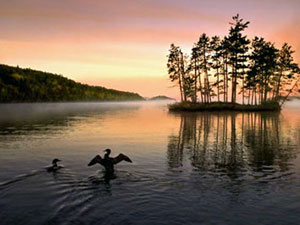Audio
Photos
More from MPR
Resources
Your Voice
| ||||||||||||||||||||||||||||||||||||||||||||||||||||||||||
Birders' numbers don't add up to clout at Capitol
April 28, 2003
 |
| Loons near an island in the Boundary Waters Canoe Area Wilderness. (Photo courtesy of Jim Brandenburg) |
St. Paul, Minn. — A 2001 study by the U.S. Fish and Wildlife Service surveyed wild bird observers, people who travel to places like Duluth to watch the hawk migration, for example, or know how to identify at least some species of birds, or simply enjoy watching them at backyard feeders. The survey found that in Minnesota, there were 1.5 million of them. That compares with 1.7 million hunters and anglers.
But birders' numbers don't translate into political clout, as Sen. Yvonne Prettner Solon, DFL-Duluth, discovered this session.
 | |||
Prettner Solon has always loved seeing the loons on Minnesota's northern lakes and hearing their calls. Then last year, she read that loons diving to pick up gravel to digest their food often picked up lead fishing sinkers instead.
"And that lead was killing those loons within two weeks of ingestion," she recalls, "and I thought, my goodness, the loons are our state bird. Something needs to be done to protect them."
It's the kind of problem that that to many environmentalists, would seem like a no-brainer. Lead is a known toxin, and putting it into the environment has proved harmful. Lead paint and lead shot for waterfowl have been banned for that reason.
Prettner Solon took a direct approach. She drafted a bill that would ban lead sinkers.
"All the stakeholders came out of the woodwork," she recalls.
|
In a court case brought by the Center for Biological Diversity the Bush administration argued in a brief that conservationists should consider the upside of bird deaths at a remote Navy live-fire range. "Bird-watchers get
more enjoyment spotting a rare bird than they do spotting a common one," the administration said.
- Minnesota Birding, January 2003 |
Anglers and the fishing tackle industry were quick to oppose the ban. Practically the lone voice supporting it was the Minnesota chapter of the National Audobon Society, a broad-based group that works on a wide range of environmental issues. Birders as a group were nowhere to be seen.
There was no groundswell of citizens defending the state bird.
"I expected more of an outpouring of support for the project. I didn't hear a whole lot of that. I heard more from the antis," Prettner Solon says.
Her proposed ban on lead sinkers is now dead for the session.
Jim Williams, an active member of the birding community who writes on birding issues, says when it comes to organizing and lobbying as a group, it's as if the nation's 45 to 70 million birders don't exist.
"Go to a hearing on off-road vehicles, on the four-wheelers using the trails they've created in state forests, say. The room is full of people who love to go four-wheeling in off-road vehicles. And there's nobody there from the birding community," Williams says.
Laura Erickson, another long-time birder and bird writer, says groups like hunters and anglers have worked actively for decades to make sure the government protects wildlife habitat for their sports. But birders simply haven't made that connection.
"Ironically, one of the pleasures of birding for many people is that it gives them the opportunity to escape politics, and just get out into the woods and watch birds," Erickson says. "And so for some people there's sort of a dissonance. It just doesn't compute to be thinking about politics when you're thinking about chickadees."
Hunters, anglers, and other outdoor recreationists pay fees that give them a vested interest in seeing that legislators use those funds wisely. Duck hunters and trout anglers pay for duck stamps and trout stamps, for example. But birders are left out of that loop. There are no fees or taxes on their sport.
Williams, Erickson, and many others in the birding community say they support a tax on bird feed, bird feeders, binoculars and spotting scopes. The money would go toward bird conservation, and help give the birding community more influence with state and federal agencies.
In Minnesota, birders spend a $500 million a year. Nationwide, they spend more than $4.6 billion.
A nationwide effort to tax birders failed a few years ago, due in part to opposition from the bird feeding industry, and in part to the "no new taxes" climate in Congress.
Meanwhile, Sen. Yvonne Pressler Solon plans to continue to press the issue of lead sinkers and their danger to loons. Next legislative session, she's hoping for more help.
|
News Headlines
|
Related Subjects
|

